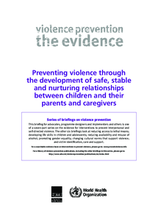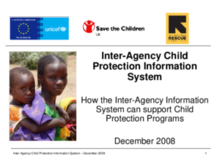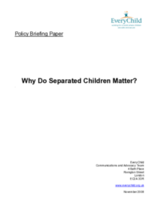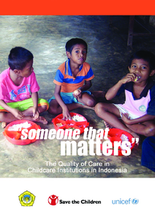Displaying 151 - 160 of 198
This Critical issue module provides guidance and practical exercises aimed at increasing the ability of staff to respond appropriately and effectively to child separation in an emergency.
This briefing looks at the effectiveness of interventions that encourage safe, stable and nurturing relationships for preventing child maltreatment and aggressive behaviour in childhood. The focus is on primary prevention programmes, those that are implemented early enough to avoid the development of violent behaviour such as child maltreatment and childhood aggression.
This report brings together an eight-part series of briefings on the evidence for interventions to prevent interpersonal and self-directed violence. By spotlighting evidence for the effectiveness of interventions, the series provides clear directions for how violence prevention funders, policy makers and programme implementers can boost the impact of their violence prevention efforts.
Sample documents to the Information Management System
Evaluation of the need for increased understanding and inclusive responses to highly marginalized and separated children.
Evaluates the need for reform within Nepal's intercountry adoption programming and the broader needs within the child protection and alternative care arenas nationally.
Examines the challenges posed in monitoring and ensuring child protection in informal and formal fostering in post-conflict areas.
This issue brief discusses the importance of childcare for disaster recovery and provides policy recommendations on how to protect and restore community childcare infrastructure in disasters.
Guidance and preconditions on use of Best Interests Determination for unaccompanied and separated children
Comprehensive evaluation of national responses and level of care standards for children without parental care in Indonesia.









